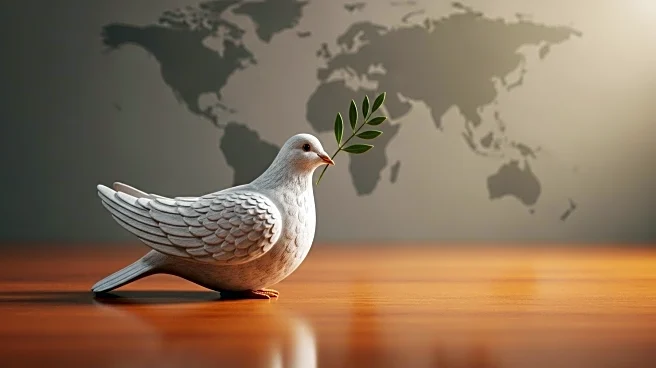What's Happening?
President Trump has called for rapid progress in the upcoming peace talks between Hamas and Israel, set to take place in Egypt. The discussions aim to address the ongoing conflict in Gaza, where recent Israeli military operations have resulted in significant casualties. The talks are based on a 20-point U.S. peace plan, which includes the release of hostages and the transfer of Gaza governance to Palestinian technocrats. Despite ongoing airstrikes, Trump has emphasized the need for a ceasefire to facilitate the release of hostages. U.S. Secretary of State Marco Rubio has echoed this sentiment, highlighting the importance of halting bombardments to enable negotiations. The talks will involve key figures such as U.S. special envoy Steve Witkoff, Jared Kushner, and Qatari foreign minister Sheikh Mohammed bin Abdulrahman Al Thani.
Why It's Important?
The outcome of these talks could significantly impact the geopolitical landscape in the Middle East. A successful negotiation could lead to a ceasefire, reducing further loss of life and destruction in Gaza. It also holds the potential to reshape governance in the region, with implications for Palestinian self-determination and Israeli security. The involvement of international mediators underscores the global interest in resolving the conflict, which has broader implications for regional stability and international relations. The talks are a critical test of diplomatic efforts to address longstanding issues between Israel and Palestine.
What's Next?
The immediate focus will be on achieving a ceasefire and the release of hostages. The talks are expected to be brief, with Prime Minister Benjamin Netanyahu indicating a limited timeframe for negotiations. The international community will be closely monitoring the situation, with potential reactions from various stakeholders, including other Middle Eastern countries and global powers. The success or failure of these talks could influence future diplomatic strategies and the role of international mediators in the region.
Beyond the Headlines
The negotiations highlight the complex dynamics of Middle Eastern politics, where external pressures and internal divisions often intersect. Hamas' willingness to engage in talks without preconditions may reflect a strategic shift, acknowledging its limited leverage after prolonged conflict. The talks also raise questions about the future governance of Gaza and the role of external actors in shaping Palestinian political structures. The humanitarian impact of the conflict remains a pressing concern, with ongoing displacement and casualties underscoring the urgent need for a resolution.








